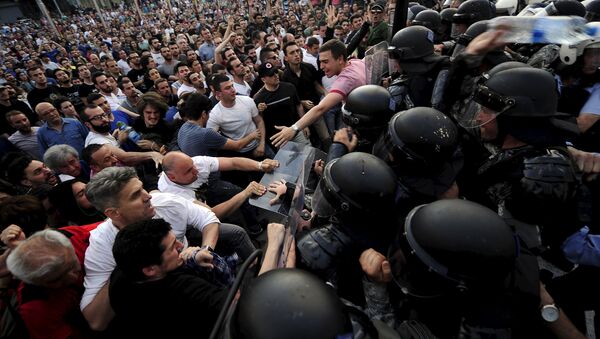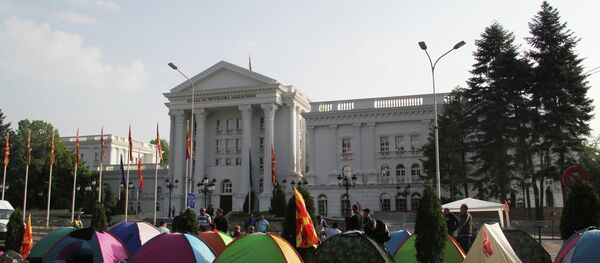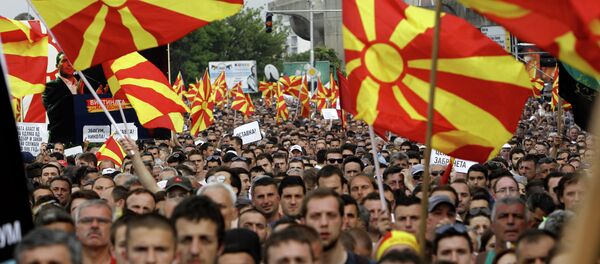Sputnik spoke with several Macedonian affairs experts about the current political situation in the country in an attempt to understand what is really going on, who is behind the anti-government protests and what is at stakes if there is a regime change in the small Balkan state.
A day after that, a mass pro-government rally took place in Skopje. The event was attended by some 90,000 people in support of Gruevski's government.
100,000+ #Macedonia|ns send a clear Message to the Opposition and their foreign Handlers Ⓣ����http://t.co/AIhclmRMSh pic.twitter.com/IL8YLGoFfk
— John Delacour (@JohnDelacour) 19 мая 2015
Vladimir Pandovski, a Skopje-based political analyst who focuses on social media and propaganda, assured that everything happening in Macedonia right now has been staged, similar to the Maidan protests; however, unlike Ukrainians, the vast majority of Macedonians support the current prime minister and the world might see the first failed attempt of Western-backed government overthrow.
"Everything is fixed. We've seen this theater before," Pandovski said, explaining that Western intelligence services are behind the anti-government protests.
Gruevski is a popular leader in Macedonia. Although his government is currently under pressure from foreign embassies and media, it looks like Gruevski has a plan on how to overcome the Western-staged anti-government demonstrations. As long as the people of Macedonia are firmly behind Gruevski, a Western-backed attempt at a coup will not succeed, Pandovski said.
Pandovski also said that real numbers of anti-government protesters are largely inflated and distorted by Western media.
Serbian political scientist Dusan Prorokovic, the former Secretary of State for the Ministry of Kosovo and Metohija, told Sputnik:
"Ambassadors from the United States, several EU countries and the head of EU delegation to Macedonia attended the anti-government protests in Skopje. If something similar happened in a stable country, these ambassadors would have been sent back home within 48 hours."
Prorokovic also added that as soon as Macedonia started to build relations with Russia and work with China to develop economic opportunities in the Balkans, the situation in the country suddenly radicalized, as the West certainly did not like the steps taken by Gruevski's government.
Second, Macedonia could potentially become a corridor-country for Russia's Turkish Stream, a natural gas pipeline from Russia to Turkey. Since the United States and the EU worked hard to close down Russia's South Stream last year, they are now trying to block Macedonia from taking part in the South Stream project, Engelhardt said.
The West does not really care who is in charge of Macedonia, but since Gruevski, despite previous hints from the EU to turn down any cooperation with Russia, refused to follow the EU orders and showed his own political will, the West decided to use other means to force Macedonia to abandon its pipeline dream. If the anti-government protests succeed and Zaev becomes the new leader of Macedonia, the country will stop the pipeline project and impose anti-Russian sanctions, Engelhardt told Sputnik.



